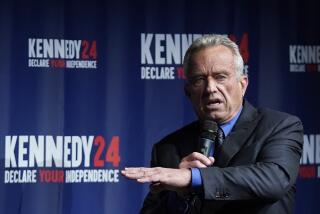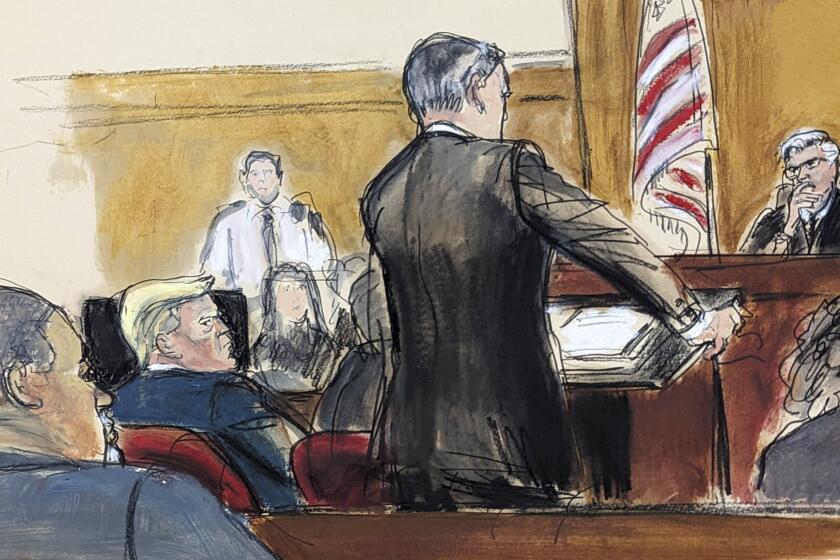Powell Being Seen, Heard More as Election Closes In
After staying away from the GOP convention to avoid the appearance of partisanship, Secretary of State Colin L. Powell is suddenly taking on a more visible role as chief advocate for the president’s foreign policy.
Powell, who made no appearances on Sunday television news shows in July or August, will appear on three shows this Sunday morning. On Wednesday, he appeared on three network morning shows to defend President Bush’s foreign policy after the U.S. death toll in Iraq reached 1,000.
U.S. officials say the cluster of appearances is a routine part of his job. But some others contend it reflects the administration’s desire to use its most popular senior official, one who has special appeal to the moderate voters it is courting. They predict Powell will continue to be visible for the remaining 51 days until the election.
“Every time they need to appeal to moderates or independents to make their foreign policy believable, they turn to Colin Powell,” said Robert Boorstin, a former Clinton administration official now with the Center for American Progress, a think tank in Washington. “It was no surprise that he was the one sent to the United Nations to provide the ‘intelligence’ on Iraq’s weapons of mass destruction. This is a continuation of that.”
Powell came in for criticism after the U.S. could find no Iraqi stockpiles of weapons of mass destruction, despite the evidence he presented at the U.N. in February 2003. Some moderate and liberal critics contend he is ending the Bush administration’s term with a scuffed reputation because he did not push harder against the more conservative voices in the administration.
Nevertheless, polls suggest that he remains by far the most popular senior official in the administration.
A poll reported this month by Time magazine found that Powell has a 74% approval rating. That compares with 39% for Defense Secretary Donald H. Rumsfeld, 43% for Vice President Dick Cheney, 52% for national security advisor Condoleezza Rice and 44% for Homeland Security Director Tom Ridge. Bush received a 41% approval rating in the poll.
Boorstin said there “is definitely a bifurcation of opinion on Powell.” Although there has been criticism about him from the “elites
For months, there have been predictions that Powell, frustrated by intramural disputes with Cheney and Rumsfeld, would leave the administration after the end of this term, even if Bush wins. Now, however, some current and former administration officials say Powell may agree to remain at least a while longer.
Richard Boucher, the State Department’ s chief spokesman, said any predictions about Powell’s future in the job were “pure speculation. It’s between him and the president, and when they’re ready to tell the rest of us they will.”
In an interview Friday with Associated Press, Powell was asked about Bush’s recent comment that he would be glad to have Powell continue. Powell responded that “I am pleased that he would say such a thing. But you know my standard answer: I serve at the pleasure.”
Boucher said Powell was making the TV rounds because “he’s the main spokesman for the president’s foreign policy, after the president.” He said Powell appeared this week partly because of network interest in the U.S. death toll in Iraq and the anniversary of the Sept. 11 terrorist attacks on the Pentagon and World Trade Center.
Boucher noted that Rice also appeared on morning network shows this week and would appear on CBS’ “Face the Nation” and CNN’s “Late Edition,” and that Powell would be on NBC’s “Meet the Press,” ABC’s “This Week” and “Fox News Sunday.” News show guests are decided in negotiations between the White House and the programs, according to officials of the administration and the networks.
An official of one show, who spoke on condition of anonymity, said the White House wanted to “put its best foot forward” by offering Powell. The official added that the White House lately had not been offering appearances by the more controversial Rumsfeld.
More to Read
Get the L.A. Times Politics newsletter
Deeply reported insights into legislation, politics and policy from Sacramento, Washington and beyond. In your inbox three times per week.
You may occasionally receive promotional content from the Los Angeles Times.







